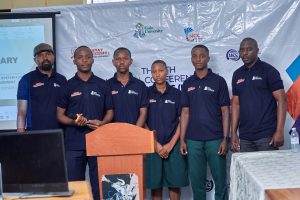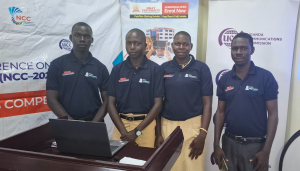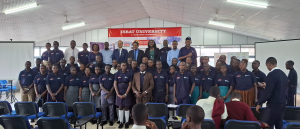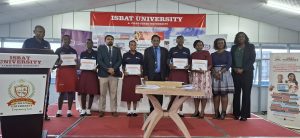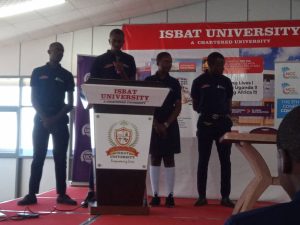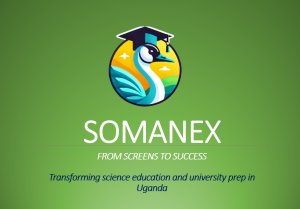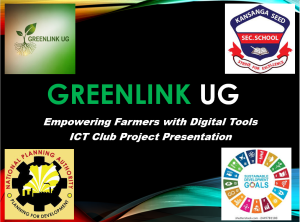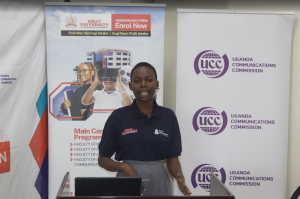Northern Region ICT Clubs Competition 2025 – Gulu University
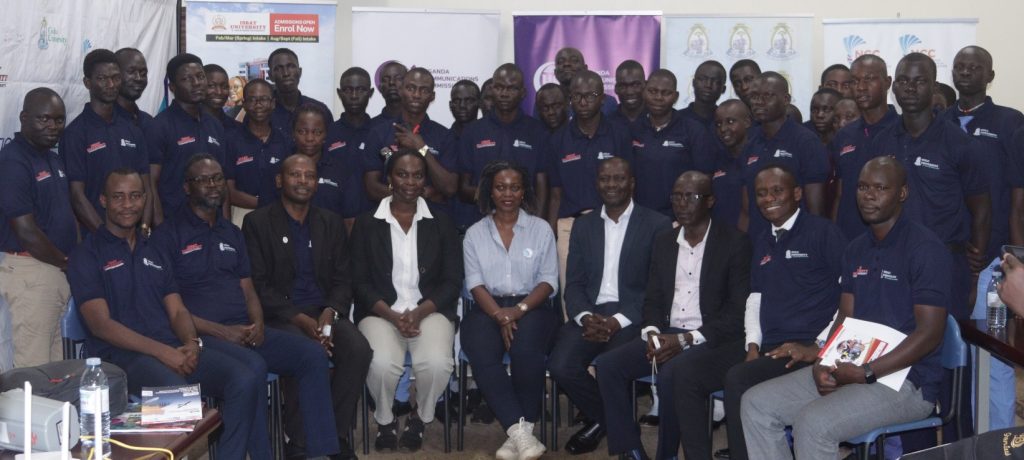
The Northern Region ICT Clubs Competition, held on 26th September 2025 at Gulu University, was a remarkable display of innovation, creativity, and purpose-driven technology among Uganda’s young learners. Organized under the Uganda Communications Commission (UCC) in partnership with KAWA Uganda, the event brought together talented students from across Northern Uganda to showcase how Information and Communication Technology can be used to transform lives and communities.
The competition served not only as a platform for presenting digital projects but also as a learning experience for participants and teachers alike. It reinforced the national commitment to nurturing ICT literacy, promoting innovation, and aligning education with Uganda’s Digital Transformation Roadmap and the UN Sustainable Development Goals (SDGs). Every project presented was a reflection of how digital skills, when well-guided, can be turned into practical community-based solutions that empower schools, farmers, hospitals, and entire communities.
Celebrating Innovation and Teamwork
The event featured some of the most inspiring projects in recent years, blending creativity with functionality. From robotics and agriculture to school management systems and community empowerment, the students’ work demonstrated how ICT Clubs across the country are becoming incubators of local innovation and entrepreneurship. The atmosphere at Gulu University was electric — a mixture of excitement, curiosity, and pride as students presented their prototypes, websites, and apps to a panel of judges comprising ICT experts, educators, and regional mentors.
Although a few schools could not attend due to long-distance travel and logistical challenges, their projects were recognized and commended for their depth and alignment with the competition’s theme:
“Harnessing Digital Innovation to Empower Sustainable Local Solutions for Uganda’s Development Goals.”
Participating Schools and Their Projects
Lira Town College – Regional Winner
Lira Town College emerged as the overall winner of the 2025 Northern Region ICT Clubs Competition with an outstanding Smart Learning and School Management Platform. This integrated system enables teachers to manage lessons, record attendance, and track student performance digitally. It is designed to improve efficiency, reduce paperwork, and promote collaboration between teachers and students. The innovation stood out for its scalability, simplicity, and potential for national adoption in both urban and rural schools.
Dr. Obote College Boroboro (Lira City)
Dr. Obote College Boroboro showcased an exceptional robotics project titled “Obote the Medical Assistant”—an AI-powered autonomous robot designed to safely deliver medicine in hospitals and isolation centers. The robot uses Arduino Mega and ESP32 CAM components to navigate hospital corridors and reduce human contact during medical delivery. The innovation was inspired by challenges observed during the COVID-19 pandemic and demonstrates how affordable technology can be leveraged to improve healthcare safety, reduce medical errors, and free up nurses’ time for patient care. This project represents a milestone for student-led robotics in Uganda.
Aduku Secondary School (Kwania District)
Aduku Secondary School impressed the audience with their project “Time Master – Smart Bell and Announcement System.” This browser-based innovation automates the school bell and announcements, ensuring that classes begin and end on schedule without manual intervention. It saves time, enhances discipline, and improves the overall organization of the school day. The system can easily be customized to fit any school timetable and demonstrates how technology can streamline administrative processes even in resource-limited schools.
Chawente Secondary School (Kwania District)
The team from Chawente Secondary School presented “DigiFarm UG”, a digital agricultural platform designed to empower smallholder farmers. The website offers farmers access to real-time weather updates, market prices, soil analysis data, and drone-based crop monitoring. It also features training materials and market linkage tools to help farmers make informed decisions. Developed using Microsoft Expression Web 4, DigiFarm UG bridges the information gap between rural farmers and markets, making technology a driver of agricultural productivity and sustainability.
St. Peter’s College Warr Girls Secondary School (SPECOWA)
St. Peter’s College Warr Girls Secondary School unveiled “Information Bridge System (IBS)”, a school-led digital communication innovation aimed at strengthening the link between schools and their stakeholders. Built on WordPress, IBS serves as a central platform for sharing newsletters, school updates, event announcements, and academic progress reports. It empowers students—particularly girls—to develop hands-on skills in website design, content creation, and digital communication while promoting transparency and collaboration between schools, parents, and alumni.
Alhijj Bezza Secondary School (Adjumani District)
Alhijj Bezza SS demonstrated a practical Google Sheets-based Attendance System, showing how free cloud tools can transform daily school operations. The project allows teachers to record, store, and analyze attendance data in real time using shared spreadsheets. It provides a simple yet effective solution for schools that lack expensive management systems, highlighting how open-source tools can modernize education when creatively applied.
Francis Ayume Memorial Secondary School (Koboko District)
Francis Ayume Memorial SS introduced an innovative Smart Attendance System powered by QR code technology. Each student receives a personalized QR ID card that is scanned upon entry, automatically recording attendance data to a linked Google Sheet. Developed using MIT App Inventor and Android Studio, this system improves data accuracy, saves time, and enhances accountability. It demonstrates the integration of mobile app development and database management in solving real-world administrative problems.
Ikwera Girls Secondary School (Apac District)
The Ikwera Girls ICT Club presented a project titled “Fighting Poverty Through Skills Empowerment.” The initiative focuses on equipping girls with ICT, entrepreneurship, and life skills as tools for poverty reduction. In communities where early marriage and unemployment are prevalent, this project encourages young women to pursue education and innovation as pathways to economic independence. Through mentorship and hands-on digital literacy training, Ikwera Girls SS is nurturing future female leaders in technology and enterprise.
Masindi Secondary School (MASESCO)
Masindi Secondary School showcased “MASESCO Web – Building Online Presence for ICT Enthusiasts.” This project empowers students to design websites and publish digital portfolios that highlight their creativity and innovation. It acts as a platform for collaboration, resource sharing, and storytelling within ICT clubs. The project embodies the spirit of visibility and inclusion, ensuring that student innovators are recognized both locally and beyond.
Schools That Could Not Attend Due to Travel Challenges
Despite their strong preparations, some schools from remote regions could not physically attend the Gulu University event due to long distances, high transport costs, and poor road connectivity. However, their innovative projects were acknowledged and remain a testament to the determination of Northern Uganda’s young innovators.
Amugu Seed Secondary School (Alebtong District) developed a project titled “AgriConnect”, a web-and-mobile platform that helps farmers market their products digitally. The platform connects producers with buyers, provides price listings, and offers agribusiness tips—turning technology into a bridge between rural farmers and urban markets.
Fatima Aloi Girls Comprehensive School (Alebtong District) created a community-centered project aimed at helping rural populations use mobile phones productively. Their initiative trains community members to use mobile devices for online education, mobile banking, small business marketing, and information access. It’s a powerful example of how ICT clubs can promote digital inclusion and economic empowerment in rural Uganda.
Dzaipi Secondary School (Adjumani District) had also prepared to present a digital inclusion project focusing on e-learning and basic ICT training for both students and teachers. Their goal was to ensure that even schools in refugee-hosting communities benefit from Uganda’s growing digital wave.
Kotido Secondary School (Kotido District), known for its Digital Builders Initiative, was equally unable to attend. Their club runs a local digital empowerment program where students learn to design websites, blogs, mobile apps, and even 3D prototypes that address local challenges. The program emphasizes teamwork, problem-solving, and digital creativity—skills that are essential for 21st-century innovation.
A Region Poised for Digital Transformation
The Northern Region ICT Clubs Competition 2025 illustrated how technology is being embraced in even the most remote corners of Uganda. From robotics to smart farming, from digital school management to community empowerment, every idea presented carried a message of hope and transformation.
The competition reaffirmed that Uganda’s young people are not merely consumers of technology—they are creators, problem-solvers, and changemakers. Their passion and ingenuity signal a bright digital future for the country, where ICT will play a pivotal role in solving social and economic challenges.
As the winning schools—Lira Town College, Dr. Obote College Boroboro, and Aduku Secondary School—prepare to represent Northern Uganda in the National ICT Clubs Finals at the National Innovation Hub, Kampala, the region stands tall. It carries with it a spirit of resilience, innovation, and collaboration that truly embodies the mission of the ICT Clubs movement:
to empower young minds to shape Uganda’s digital tomorrow.

